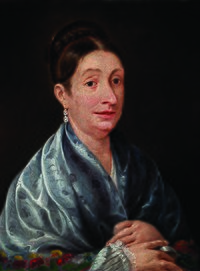Josefa Ortiz de Domínguez
|
Doña Josefa Ortiz de Domínguez |
|
|---|---|

Posthumous interpretation of Josefa Ortiz, dated 1880.
|
|
| Born |
María Josefa Cresencia Ortiz y Girón April 19, 1773 Valladolid, New Spain |
| Died | March 2, 1829 (aged 55) Mexico City, Mexico |
| Body discovered | Mexico City |
| Residence | |
| Nationality |
Spanish prior to 1821 Mexican after 1821 |
| Other names | La Corregidora |
| Spouse(s) | Miguel Dominguez (m. 1793–1829) |
| Children | José Domínguez Ortiz Mariano Dominguez Ortiz Miguel Dominguez Ortiz Ignacia Dominguez Ortiz Micaela Dominguez Ortiz Dolores Dominguez Ortiz Manuela Dominguez Ortiz Magdalena Domínguez Ortiz Camila Domínguez Ortiz Mariana Dominguez Ortiz José Dominguez Ortiz |
María Josefa Crescencia Ortiz Téllez- Girón, popularly known as Doña Josefa Ortiz de Domínguez or La Corregidora (April 19, 1773 – March 2, 1829) was an insurgent and supporter of the Mexican War of Independence, which fought for independence against Spain, in the early 19th century. She was married to Miguel Domínguez, corregidor of the city of Querétaro, hence her nickname.
Ortiz de Domínguez was the daughter of don Juan José Ortiz; a captain of Los Verdes regiment, and his wife doña Manuela Girón Ortiz was born in Valladolid (today Morelia, Michoacán). Her godmother was doña Ana María de Anaya. Ortiz's father was killed in a battle during her infancy and her mother died soon after. María Sotera Ortiz, Josefa's sister, took care of her upbringing and managed to secure a place for her in the prestigious Colegio de las Vizcaínas in 1789. She married Miguel Domínguez, a frequent visitor to the college, on January 24, 1791 in Mexico City.
In 1802, Miguel Domínguez was appointed by the Viceroy of New Spain to the office of "Corregidor" (a magistrate) in the city of Querétaro. During that period, Ortiz de Domínguez took care of household chores and the education of their 14 children. Ortiz de Domínguez developed an early sympathy for the Amerindian, mestizo and the criollo community who were oppressed by the Spanish colonial government. Amerindian people were oppressed; mestizos and criollos were often seen as second-class citizens and were relegated to secondary roles in the administration of the colony. This obviously created discontent among many criollos who soon started to organize secret and literary societies where works of the Enlightenment banned by the Roman Catholic Church were discussed. Ortiz de Domínguez herself attended some of the early meetings and eventually convinced her husband to organize a number of political meetings in their house. The meetings, attended by educated figures including Miguel Hidalgo y Costilla and Ignacio Allende, quickly turned to revolutionary issues.
...
Wikipedia
